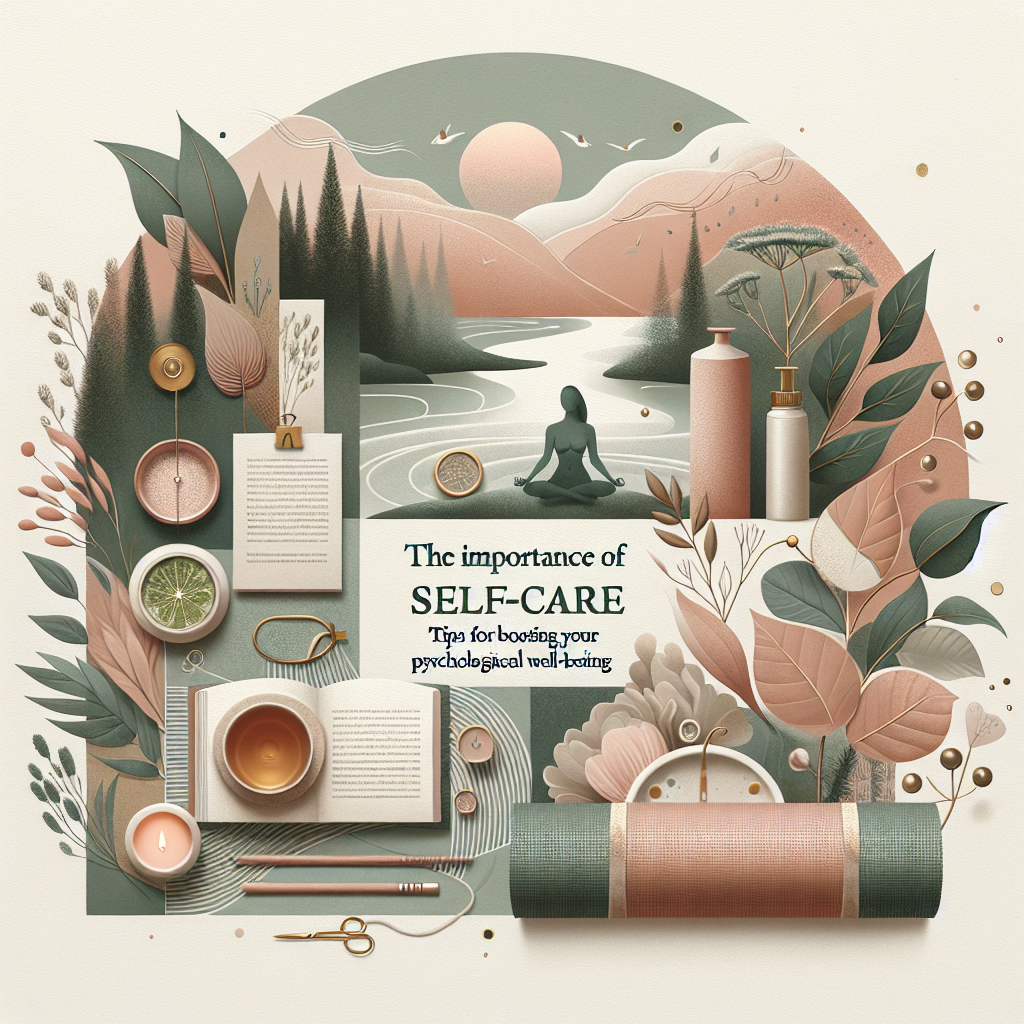In today’s fast-paced and highly stressful world, it can be easy to neglect our own well-being in favor of meeting deadlines, fulfilling obligations, and taking care of others. However, the importance of self-care cannot be overstated when it comes to maintaining our mental and emotional health. Self-care is essential for boosting our psychological well-being, reducing stress, improving our mood, and enhancing our overall quality of life.
What is Self-Care?
Self-care can be defined as the practice of taking care of yourself in order to improve your physical, emotional, and mental well-being. It involves making choices that prioritize your own needs and nurture your body, mind, and spirit. Self-care is not selfish or indulgent; rather, it is a necessary part of maintaining a healthy and balanced life.
Why is Self-Care Important for Psychological Well-Being?
Self-care is crucial for maintaining good mental health and psychological well-being. When we neglect to take care of ourselves, we can become overwhelmed, stressed, and emotionally exhausted. This can lead to a variety of negative consequences, including anxiety, depression, burnout, and even physical health problems.
Practicing self-care on a regular basis can help to prevent these issues and promote a more positive and balanced state of mind. By taking the time to care for ourselves, we are better equipped to handle the challenges and stresses that life throws our way. Self-care can improve our resilience, boost our self-esteem, increase our self-awareness, and enhance our overall sense of well-being.
Tips for Boosting Your Psychological Well-Being Through Self-Care:
1. Prioritize Sleep: Getting enough rest is essential for good mental health. Aim for 7-9 hours of quality sleep each night to help reduce stress, improve your mood, and boost your cognitive function.
2. Practice Mindfulness: Mindfulness involves paying attention to the present moment without judgment. This can help to reduce stress, increase your self-awareness, and improve your overall sense of well-being.
3. Stay Active: Regular physical activity has been shown to have numerous benefits for mental health, including reducing anxiety and depression, improving mood, and boosting self-esteem.
4. Eat Well: A healthy diet is crucial for both physical and mental well-being. Make sure to eat a balanced diet rich in fruits, vegetables, whole grains, and lean proteins to support your mental health.
5. Take Breaks: It’s important to take time for yourself throughout the day to relax and recharge. Whether it’s a quick walk outside, a few moments of deep breathing, or a short meditation session, taking breaks can help to reduce stress and improve your focus.
6. Connect with Others: Social connections are essential for good mental health. Make time to connect with friends, family, and loved ones on a regular basis to boost your mood and reduce feelings of isolation.
7. Set Boundaries: Learning to say no and set boundaries with others is an important part of self-care. Protect your time and energy by setting limits on what you can realistically handle.
8. Seek Help When Needed: If you are struggling with your mental health, don’t be afraid to seek help from a professional. Therapy, counseling, and medication can all be valuable tools in improving your psychological well-being.
FAQs About Self-Care:
Q: How do I know if I need to practice more self-care?
A: If you are feeling overwhelmed, stressed, anxious, or emotionally exhausted, it may be a sign that you need to prioritize self-care in your life. Pay attention to your feelings and listen to your body to determine when you need to take a break and care for yourself.
Q: What are some simple self-care activities I can do every day?
A: Simple self-care activities can include taking a warm bath, going for a walk, practicing deep breathing exercises, journaling, listening to music, or spending time in nature. Find activities that bring you joy and relaxation and make time for them every day.
Q: Is self-care the same as being selfish?
A: No, self-care is not selfish. Taking care of yourself is necessary for maintaining good mental health and well-being. By prioritizing your own needs and nurturing your body, mind, and spirit, you are better equipped to take care of others and navigate life’s challenges.
Q: How can I make self-care a priority in my busy schedule?
A: It can be challenging to make self-care a priority, especially when you have a busy schedule. However, it’s important to remember that self-care is not selfish; it’s necessary for your overall well-being. Try to carve out small pockets of time throughout the day to practice self-care activities, even if it’s just for a few minutes at a time.
In conclusion, self-care is essential for boosting your psychological well-being and maintaining good mental health. By prioritizing your own needs and nurturing your body, mind, and spirit, you can reduce stress, improve your mood, and enhance your overall quality of life. Incorporate self-care activities into your daily routine and make time to care for yourself on a regular basis. Your mental health and well-being are worth the investment.




Leave A Comment